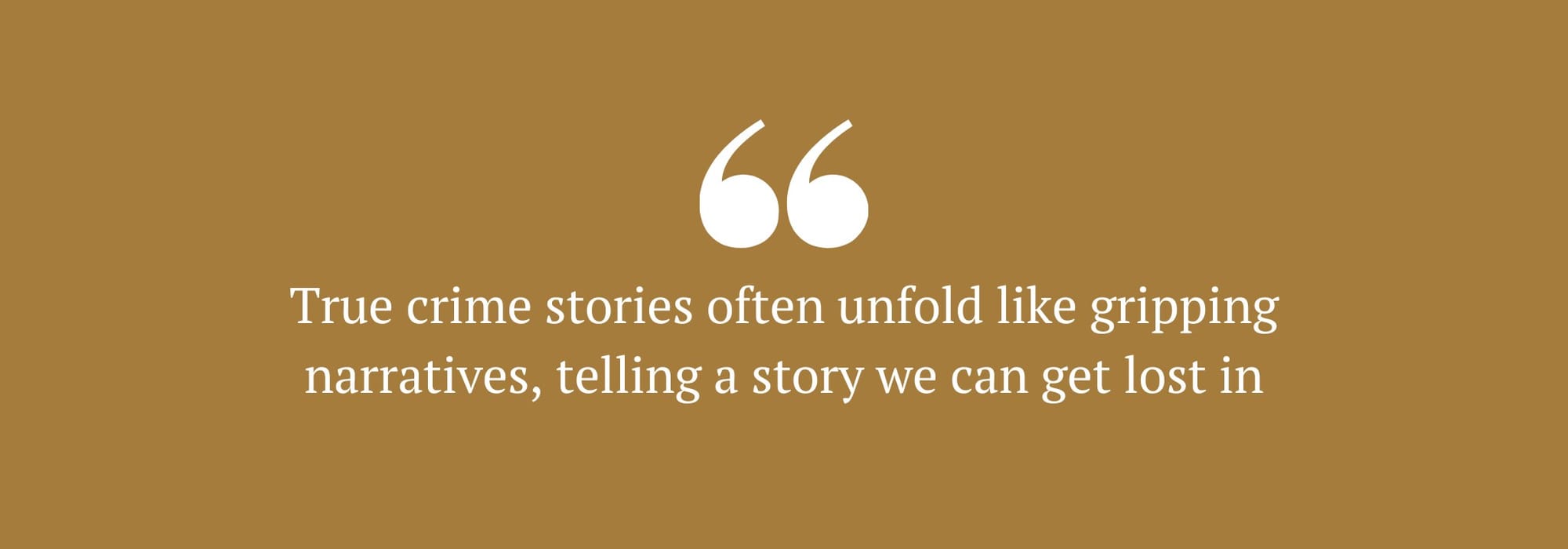We investigate this, with help from a counsellor
On streaming platforms, podcasts, TV, and radio, it seems like everyone’s talking about true crime. The genre has seen a colossal boom over the past decade, with true crime consistently topping the viewing and listening charts. So, what is it that draws so many people to the genre? And what impact can it have on us all?
Who’s tuning in?
Since the early 2000s, studies have found time and again that women significantly outnumber men when it comes to true crime audiences, with a 2018 study published in the Journal of Radio & Audio Media confirming this pattern when it found around 73% of true crime podcast listeners are women. It’s an interesting demographic, particularly when viewed alongside the findings of a study in the Journal of Urban Affairs, which revealed that women are generally more fearful of being the victim of crime than men – despite the fact that men are more likely to be victims of crime.
It was these two components that led social psychologist and professor at Illinois Wesleyan University, Amanda Vicary, to explore this trend in another medium. In research published in Social Psychological and Personality Science, Vicary looked at Amazon book reviews that dealt with different types of violence. She found the trend continued, as men were more likely to read and review books about war, while women were more likely to read and review true crime books.
Appeal for witnesses
When it comes to theories around why women, in particular, are so drawn to true crime, Vicary concluded that women enjoyed reading about survival or learning how they may be able to prevent a crime, and are more likely to empathise with victims – but that’s only one theory in an ongoing debate. Other researchers propose that true crime is a means of thrill-seeking, others believe it’s about a natural fascination with taboo subjects. Counsellor Jenny Warwick has her own theories, too.
“People are fascinated with human psychology, particularly criminal psychology,” she says. “We are often intrigued by the behaviours and motives behind criminal acts. By looking for an understanding of the motivations, upbringing, and patterns of infamous serial killers, for example, we can get an insight into criminal psychology.”
Jenny also points to the problem-solving element of the storytelling, where it becomes a kind of entertainment that we can get lost in. “It’s enjoyable to piece together the puzzle of a crime, and come up with theories about who the perpetrator might be and why the crime occurred.
“The fact it’s based on actual events adds an extra dimension. True crime stories often unfold like gripping narratives, telling a story we can get lost in. There might be an aspect of escapism here, where we can forget our current worries and get hooked on the narrative. If we find answers to who did it, how they did it, and why, we might be better positioned to protect ourselves and our loved ones.”
It’s an idea that seems to resonate with many people. In data collected by OnePoll, out of 2,000 survey respondents, 76% of people said that they believe consuming content about true crime helps to avoid similar situations happening to them. But the story doesn’t end there.

What’s the impact?
When it comes to the impact of consuming the genre, the jury’s split. In a US YouGov survey, 20% of respondents think it makes people more likely to commit a crime, and 29% less likely – plus, 62% said they think it makes people more vigilant and aware of their safety, while 40% think it makes people needlessly scared or paranoid.
Jenny also highlights some of the risks that can occur when consuming distressing content:
-
The emotional impact. True crime shows and podcasts often feature re-enactments of real-life crimes, which can leave an emotional impact. We might feel stressed or anxious, especially after viewing or hearing about disturbing scenes, which can persist beyond the episode, affecting our mental wellbeing and daily life.
-
Desensitisation. Repeated exposure to graphic content can desensitise us to violence, changing our sensitivity and perception of it. More recently, there has been a shift in focus, putting the victims at the centre of these stories, which helps give a more empathetic and balanced portrayal of the cases.
-
Sleep disturbances. Consuming intense true crime content could disrupt sleep. Our brain needs to process all this intense information, which can interfere with our ability to fall asleep, and even cause nightmares.
In order to enjoy true crime in a way that’s right for you, Jenny recommends setting some limits. “Establish boundaries on the amount and type of true crime content you consume to prevent emotional overwhelm,” she advises. For example, perhaps there are particular themes you find very distressing, and should be avoided. A lot of media now comes with content warnings – this may be in episode descriptions, books blurbs, or listing descriptions.
Jenny’s second tip is to make sure you take breaks and tune-in to yourself. “Give yourself time between episodes or stories to process and decompress from the intense narratives,” she says. “This will help you avoid getting too emotionally invested in the content. And after watching or listening to true crime content, it’s important to practise self-care activities like meditation, exercise, or spending time with loved ones to balance the emotional impact.”
While it’s great to take steps to take care of yourself as an individual, as the genre has grown, many of those creating the content are working hard to make their reporting as responsible as possible, too. This includes centring the narrative on the victim, working with families in empathetic ways, highlighting minority cases that may not have received as much media attention, and building evidence that can lead to real-life justice.
There’s no escaping the impact that true crime is having on our culture and conversations at the moment. And while researchers will continue to debate the undeniable draw people feel to the genre, one thing’s for sure, the true crime scene isn’t going anywhere anytime soon.


Comments